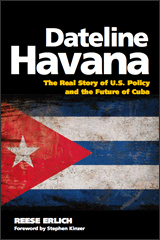 It’s past time to acknowledge the real story of U.S. policy toward Cuba over the last 50 years and to seize this unique moment in history to change it. Reese Erlich, in his well-researched book Dateline Havana: The Real Story of U.S. Policy and the Future of Cuba, provides a snappy historical review of U.S.-Cuba relations, outlines insightful future scenarios, and points to opportunities that will exist under a new U.S. administration and a new Congress.
It’s past time to acknowledge the real story of U.S. policy toward Cuba over the last 50 years and to seize this unique moment in history to change it. Reese Erlich, in his well-researched book Dateline Havana: The Real Story of U.S. Policy and the Future of Cuba, provides a snappy historical review of U.S.-Cuba relations, outlines insightful future scenarios, and points to opportunities that will exist under a new U.S. administration and a new Congress.
But as we enter what many think will be a new era of politics, the question remains: Will the Obama administration and the 111th Congress be wise enough to change course? Senator Mike Enzi (R-WY), a leader in bipartisan efforts to end the ban on travel to Cuba, regularly quotes his father: “If you keep doin’ what you’re doin’, you’ll keep gettin’ what you got.”
Erlich posits that the original ideals of the Cuban revolution remain valid: land reform, ending racism, ending U.S. domination, economic equality, and self-sufficiency, among others. He does not paint Cuba as a paradise, but rather points to real problems and challenges within the Cuban system. For example, Cubans certainly do migrate to the United States, largely for economic reasons. Most Cubans, however, choose to remain and work within their own country — struggling to survive economically and looking for solutions within the Cuban socialist system.
To understand this complicated reality, Erlich turns to history, contrasting the radically different versions of history studied by Cubans and U.S. citizens. He says that U.S. citizens are taught that we liberated Cuba from Spanish colonial rule in 1898; Cubans are taught that one form of domination replaced another. Erlich’s review of the realities and myths of the Teller Amendment, the Platt Amendment, Cuban land reform, anticommunism as the excuse (not the cause) for U.S. antagonism, assassination plots, and the Bay of Pigs deserves our attention. It’s noteworthy that some Cuban-American veterans of the Bay of Pigs invasion, who consequently spent substantial time in Cuban jails, and scores of middle-aged Cuban Americans who came here as children or young adults to “escape” from Castro’s Cuba, now work tirelessly for an end to the embargo.
Some of the challenges faced by Cuba are traced by Erlich to the embargo and to the influence on U.S. policy of the hard-line Cuban exiles that arrived in the United States before 1980. Erlich devotes more than two full chapters to the history and power of the Cuban-American community lobby, largely based in south Florida.
Recent reputable polls demonstrate that the community is changing vis-a-vis its political opinions on Cuba policy. In 2007, a Florida International University poll showed that 64% of Cuban Americans wanted President Bush’s 2004 policies on family travel and remittances rescinded. More recent polls corroborate this finding and go further, to the point of reaching a majority of Cuban Americans who support removal of travel restrictions for all U.S. citizens, not just families.
A Cuban American from south Florida points to the “grandmother factor,” which maintains that Cuban Americans will more freely vote for change after they no longer have to account to their grandmothers for their votes. The “hold” that Cuban-American embargo supporters have on U.S. policymakers appears to have lessened during the 2008 presidential elections: though President-elect Obama increased the percentage of votes received from the Cuban-American community over that received by John Kerry in the last presidential election, Obama won the state of Florida without the Cuban-American vote, so he does not owe them any payback for winning Florida for him.
A new policy toward Cuba in 2009 would have an impact beyond Cuba; it would send a strong signal to our South and Central American neighbors that a new day has dawned in the United States in relation to Latin America as a whole. This is a change that Latin American leaders have been promoting to President-elect Obama.
As president, Obama should make good on his campaign promise to immediately remove travel and remittance restrictions on families. But he should also be open to broader and deeper changes, for example, to engage diplomatically with Cuba and to signal Congress that he would welcome their legislative action to end the travel ban — and that he would sign the bill. The days of the presidential veto threat are over, at least for now.
Erlich raises sticky issues in the concluding chapter of the book, including listing Cuba on the State Department’s list of terrorist-supporting states, the Guantánamo Bay Naval Base, and the U.S. position on incremental reforms taking place in Cuba under President Raul Castro, among others. His questions about these issues raise additional questions: the fate of Cuban “dissidents,” the Cuban Five, human rights and civil liberties in Cuba, and more. Raul Castro has several times offered diplomatic talks with the United States, and he recently broached the subject of a possible prisoner exchange — Cuban dissidents in Cuban jails for the Cuban Five serving life sentences in U.S. prisons. The Obama Administration should think big, accept a rapprochement with Cuba, and remain open to new avenues of diplomacy. Erlich notes with the overtures made by Raul, “The ball is [now] in the U.S. court.”
After 50 years of covert and overt attacks on our neighbor island, after cruel policies that separate Cuban families and disadvantage U.S. citizens, and into our 11th “embargo” president, this engaging and well-written book is highly recommended as a prelude to change. Citizen awareness and action is called for now. Read the book and join the effort.